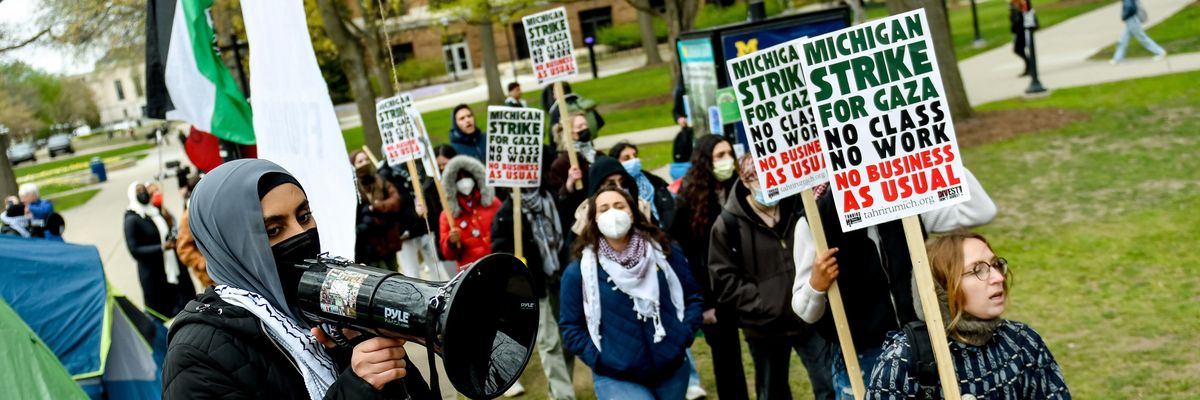The coming year promises to be a dangerous time for progressive groups. Last month the House passed resolution 9495, which would grant the executive branch extraordinary powers to designate nonprofit organizations as terrorist supporting and thereby to revoke these organizations’ 501(c)3 status unilaterally and without due process.
The significance of this development is chillingly clear now that we have evidence of a right-wing plan to use the pretext of fighting terrorism to shut down more than 100 progressive organizations, including Jewish Voice for Peace, Black Lives Matter, Students for Justice in Palestine, and the Democratic Socialists of America.
As reported on the progressive news site Truthout, in November a right-wing think tank with ties to the Heritage Foundation published a glossy report that purports to show how these and other progressive organizations are “pro-terrorism.” The report outlines a series of steps that the think tank, the Capital Research Center, believes should be taken to shut these 159 groups down, ranging from the revocation of their 501(c)3 or 501(c)4 statuses to the prosecution and deportation of their leaders. Such moves, if made by the Trump administration, could effectively shutter progressive civil society.
History tells us that right-wing authoritarian movements and governments begin by attacking leftist and progressive parties and organizations, and then proceed to target other opposition parties and civil society organizations.
The “evidence” provided for progressive groups’ supposed support for terrorism is highly suspect. In many cases, the Capital Research Center simply highlights statements made by these groups that are taken to be insufficiently condemnatory of Hamas. Groups’ use of language like “armed resistance” to describe Hamas’ actions is taken, in and of itself, to constitute active support for this Palestinian militia. We are in the realm here of “thought crimes.”
As a historian of modern Europe, I am alarmed by this call to shut down progressive organizations and parties en masse: The current push to do so resonates with the history of 20th-century fascism.
In April 1919, just weeks after the official formation of the Italian fascist movement, Benito Mussolini’s supporters violently attacked the offices of Avanti, a socialist newspaper. The Italian Blackshirts then carried out a campaign of violence against trade unionists and socialists.
More than a decade later, when Adolf Hitler was granted dictatorial powers through the March 1933 Enabling Act, among his government’s first actions was the outlawing of opposition parties, including the Social Democratic Party. Leaders of the Social Democratic Party were targeted for arrest, faced torture, and were detained in prisons. As had already happened to the Communist Party and would subsequently happen to other opposition parties, the German Social Democratic Party in May and June of 1933 was rendered inoperative. The Party was shut down by the new regime.
Today in the United States, the Capital Research Center is promoting a plan to shut down progressive opposition parties like the Democratic Socialists of America and to bring down a wide range of progressive organizations including the Center for Constitutional Rights, the Council on Islamic American Relations, the Movement for Black Lives, the National Lawyers Guild, Black Lives Matter, Students for Justice in Palestine, and Jewish Voice for Peace. These and other progressive organizations, while not nearly as powerful as the left in early 1930s Germany, nevertheless have the capacity to lead mass movements and to effectively resist regressive political transformations. This is why they are being targeted.
In the closing weeks of the 2024 presidential campaign, Vice President Kamala Harris indicated that she believes that now President-elect Donald Trump is a fascist and that he wants to rule as a dictator. To say that Trump is a fascist is to put forward a hypothesis, informed by historical comparison, about how he intends to govern. But would-be strongmen can only carry out their plans with the acquiescence of wider layers of the state and of civil society.
Donald Trump may want to forcibly repress progressive dissent—he has effectively said as much—but how much support will his efforts receive? Will the incoming Republican-led Senate follow the House in granting the executive branch extraordinary powers both to designate nonprofit organizations as “terrorist-supporting” and to revoke their 501(c)3 statuses without due process?
Will conservative commentators who have kept their distance from the MAGA movement nevertheless amplify and endorse the Capital Research Center’s report calling for the aggressive dismantling of Black Lives Matter, Students for Justice in Palestine, Jewish Voice for Peace, and the Democratic Socialists of America, among more than 100 other organizations?
Will centrist politicians, media outlets, and commentators stay silent about attacks on the left, or will they speak out in defense of the right of progressive parties and organizations to exist?
When considering possible executive branch moves to shut down progressive organizations, those from different parts of the political spectrum might feel conflicted. Perhaps there have been statements made or actions taken over the last year by progressive organizations—including organizations that have protested in favor of a cease-fire in Israel and Palestine—that you have found objectionable. Perhaps you believe that the progressive movement has in some way taken the wrong tack.
Nevertheless, now is the time to think carefully about political principles concerning assembly, expression, and protest. Now is the time to consider the precedent that widespread attacks on progressive organizations would establish, and about the powers that should or should not be invested in a would-be authoritarian president.
History tells us that right-wing authoritarian movements and governments begin by attacking leftist and progressive parties and organizations, and then proceed to target other opposition parties and civil society organizations.
Defending progressive organizations in this moment will help ensure the protection of civil liberties and democratic institutions over the coming months and years. We are living through a historically dangerous moment. It is also a moment for clarity and courage.
